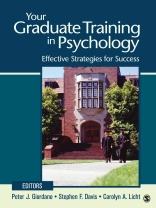How can graduate students in psychology thrive during their graduate school experience? Rather than focusing on graduate school admission or the post-graduate experience, Your Graduate Training in Psychology provides current and incoming graduate students with a wealth of information on how to succeed in graduate school. Using a comprehensive, easy-to-follow approach and an emphasis on the development of specific skills for success, the chapter authors discuss important issues and strategies in chronological order, from the first year of graduate study (‘Settling In’) to what students need to know as they complete their program (‘Winding Down and Gearing Up’). This text is ideal for current graduate students in all areas of psychology and for undergraduate seniors planning to attend graduate school. The book would be useful in courses such as Psychology Capstone Seminar, Careers in Psychology, or a Psychology Orientation course.
Tabela de Conteúdo
1. Settling in the Right Way: Playing by the Rules – Stephen F. Davis, Jason P. Kring
2. Maximizing Success in Your Graduate Training – Christia Spears Brown
3. Setting Your Path: Begin with Your Dissertation in Mind – Daniel P. Corts, Holly E. Tatum
4. Relationship Issues: Peers, Faculty, and Families – Susan R. Burns
5. When Things Don’t Go According to Plan: Shifting Areas, Programs, or Schools – Christina M. Leclerc, Jonathan B. Banks
6. Important Considerations for Ethnic Minority Graduate Students – Loretta N. Mc Gregor, G. William Hill IV
7. Important Considerations for International and Older, Non Traditional Students – G. William Hill IV, Loretta N. Mc Gregor
8. Graduate Students with Special Needs – Alex Watters, Susan R. Burns
9. Important Considerations for Online Graduate Training – Victor A. Benassi, Michael J. Lee
10. Self-Care in Graduate School: Finding Your Optimal Balance – Carolyn Licht
11. Effective Writing: Did You Mean to Say That? – Bernard C. Beins
12. Developing Your Teaching Skills – Robb Bubb and William Buskist
13. Developing Your Clinical and Counseling Skills – Radha G. Carlson
14. Developing Your Research Skills – Regan A.R. Gurung
15. Developing Your Presentation Skills – Lonnie Yandell
16. Success in Externships and Internships – Erica Chin, Laurie Reider Lewis
17. Preparing for Comprehensive Exams – Valerie M. Gonsalves, Leah Skovran Georges, Matthew T. Huss
18. Skill Development for Oral Presentations and Examinations – Catherine E. Overson, Gary S. Goldstein
19. They Have My Money!: Applying for Research Funding – Leah Skovran Georges, Valerie M. Gonsalves, Matthew T. Huss
20. Working with Your Major Professor and Dissertation Committee – Seraphine Shen-Miller, David S. Shen-Miller
21. Developing a Plan for Your Career After Graduate School – Randolph A. Smith
22. To ABD or Not to ABD? That is the Question – Kimberly M. Christopherson, Jeffrey S. Bartel
23. Applying for Academic Positions – Krisztina Varga Jakobsen
24. Applying for Clinical and Other Applied Positions – Janet R. Matthews, Lee H. Matthews
25. When Things Don’t Go According to Plan: What if You Don’t Find a Job? – Jared Keeley
Sobre o autor
Carolyn A. Licht was appointed to the position of Supervising Psychologist/Coordinator of Psychiatric Residencies for the Office of Counseling and Psychological Services at Fordham University in New York in July 2011. Previously she served as a staff psychologist in the Family Care Center at Harlem Hospital working in the pediatric and adult infectious disease medical clinics specializing in the care of individuals infected and affected by HIV, substance use, and trauma. She received her Ph D in Clinical Psychology with a child and family specialization from Fordham University′s Graduate School of Arts & Sciences, Bronx, NY in 2007, and was licensed in New York State in 2009 after completing her predoctoral internship at Jacobi Medical Center and her postdoctoral fellowship as a Columbia University Medical Center affiliate at Harlem Hospital. Areas of research, publication, and/or presentation include occupational stress, ADHD, family systems constructs, issues related to disclosure and neurocognitive functioning in pediatric HIV, and clinical management of triply diagnosed patients. She is a member of the American Psychological Association and New York State Psychological Association as well as Psi Chi (National Honor Society in Psychology), Sigma Xi (The Scientific Research Society), Phi Kappa Phi, Omnicron Delta Kappa, and Alpha Chi (honor societies reflecting academic excellence).












